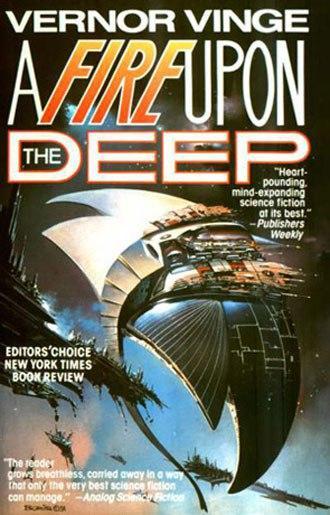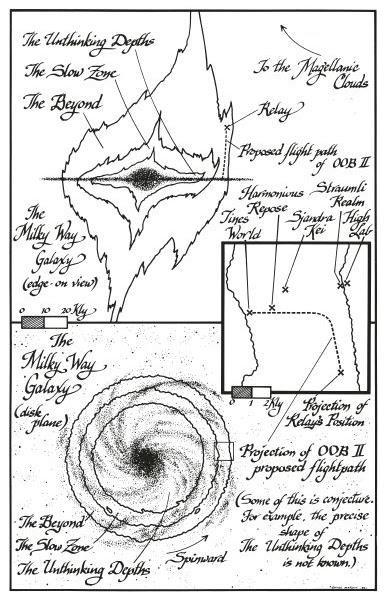A Fire Upon the Deep, by Vernor Vinge
Every now and then I like to dip my toe back into the waters of pure science fiction. If you don’t share that interest, and almost nobody who reads this blog does, this review probably isn’t for you.
Vernor Vinge is one of the greats of recent(ish) science fiction, responsible among other things for the real world concept of the singularity (later popularised by futurologist Ray Kurzweil). Vinge’s claim to fame however doesn’t rest on coining a vaguely useful word, but on writing one of the all time classics of the space opera genre.

This is big-ticket big concept SF. Vinge postulates a dense and complex future in which the galaxy (and beyond) is home to a vast number of intelligences of varying technological development. Unusually for SF, humanity here has no particular importance in galactic affairs – we’re one species among a great many.
Librarian Ravna Bergsndot is the first human ever to get to work at Relay, an immensely wealthy and advanced interstellar communications hub. That makes her suddenly important when back home some other humans accidentally let loose an ancient artificial intelligence which develops so swiftly and with such aggression that it threatens to annihilate entire species and civilisations.
On the wider galactic stage where history is measured in billions of years, that’s not necessarily actually that big a deal. On the other hand, if you live in the vicinity it’s quite important.
The galaxy in Vinge’s novel is separated, possibly artificially, into “zones of thought” – layers of space in which technology and cognition are increasingly limited the closer you get to the galactic core. Earth lies (lay, it doesn’t feature in the novel) in the Slow Zone where faster than light travel is impossible and AI incredibly limited. Civilisation largely exists in the zone above and further out where these things are possible. Beyond that is, well, the Beyond where intelligences we cannot even comprehend do whatever it is they do.
‘The Beyond and below are like a deep of ocean, and we the creatures that swim in the abyss. We’re so far down that the beings on the surface – superior though they are – can’t effectively reach us. Oh, they fish, and they sometimes blight the upper levels with poisons we don’t even understand. But the abyss remains a relatively safe place.’ She paused. There was more to the analogy. ‘And just as with an ocean, there is a constant drift of flotsam from the top.
Go too close to the center and you hit the Unthinking Depths, where advanced technology simply fails and intelligence becomes impossible.

When the Blight starts to metastasize, any attempt to stop it becomes worth pursuing no matter how desperate. It’s known that a single human ship from the group who initially triggered the Blight’s release escaped and that they possibly have something with them that could damage it. Ravna is given a ship and sent to find and rescue that other human crew. All she has to help her is an ancient resurrected astronaut who carries a fragment of AI superintelligence within his brain and two alien traders each of whom looks “like a small ornamental tree sitting in a six-wheeled cart”.
Meanwhile, the human ship who escaped the Blight have crash landed on a medieval world with no knowledge of the wider galaxy or the attention that’s now being focused on it. That world is occupied by the Tines, pack-sentients where three to six individual members make up a single personality.
The west edge of their landing area was swarming with … things. Like wolves or dogs, but with long necks, they moved quickly forward, darting from hummock to hummock. Their pelts were the same gray green of the hillside, except near their haunches where she saw white and black. No, the green was clothing, jackets. Johanna was in shock, the pressure of the bolt through her chest not yet registering as pain. She had been thrown back against uptilted turf and for the moment had a view of the whole attack. She saw more arrows rise up, dark lines floating in the sky. She could see the archers now. More dogs! They moved in packs. It took two of them to use a bow – one to hold it and one to draw. The third and fourth carried quivers of arrows and just seemed to watch.
It sounds like a confused and unlikely mess, but Vinge absolutely pulls it off. He conjures up a vast, complicated and ancient web of civilisations of which we form just a tiny part and then focuses in on a handful of characters – human and alien – because he never forgets that however large the canvas it’s the small lives upon it which actually matter.
On the Tines’ planet the arrival of the aliens is both opportunity and potential disaster. It turns a cold war between two feudal powers hot, as each tries to capitalise on their access to the crashed aliens and their technology. Much of the pleasure of the book comes from exploring the nature of the Tines, with the peculiarities of their psychology and the advantages and limitations of their pack nature all being convincing and well explored.
The human survivors on the Tines’ world find themselves enmeshed in medieval power-politics of a type utterly unfamiliar to them, struggling both to adapt to a species never before encountered and to the precarious nature of their own position. Their rescuers have their own internal issues, none of them really being suited to a task of the magnitude that’s fallen to them, and come to find themselves the McGuffin in a competition between rival fleets each capable of annihilating planets. It’s the small scale and the large again, the epic giving that sense of wonder but the personal giving it all a point.
Vinge combines all this with a nice (though now a bit dated) satirical edge in that due to bandwidth issues the various aliens of the galaxy communicate via something suspiciously similar to Usenet. Like any social media it’s full of inaccuracies, errors and downright lies. The story is interspersed with posts on the galactic net – some well informed, some malicious, some downright clueless.
In the end though if you read this sort of novel it’s for the sheer imaginative splendour of it all. That feeling of a universe that is deeper and richer and older than we can imagine. A universe where there is wonder. It’s basically escapist, but there’s nothing wrong with the occasional escape.
Our current understanding, which looks extremely unlikely to be overturned, is that faster than light travel is in fact impossible. Coupled with that is the fact that we’ve been staring out into the dark for a while now and the universe is notable primarily for its utter silence. If there’s anybody out there they seem to be very far away and not particularly chatty.
Still, if we can take pleasure from multi-generational Irish family sagas with abusive uncles and judgemental priests; from Brooklyn authors struggling with the meaning of their very comfortable lives; from tales of failing marriages, mid-life crises and murders; why not too from aliens and civilisations as unlikely as they are splendid? If you’ve no love for SF this book won’t change your mind, but if you do it’s a lot of fun.
Filed under: Science Fiction, Vinge, Vernor Tagged: Vernor Vinge, Zones of Thought

